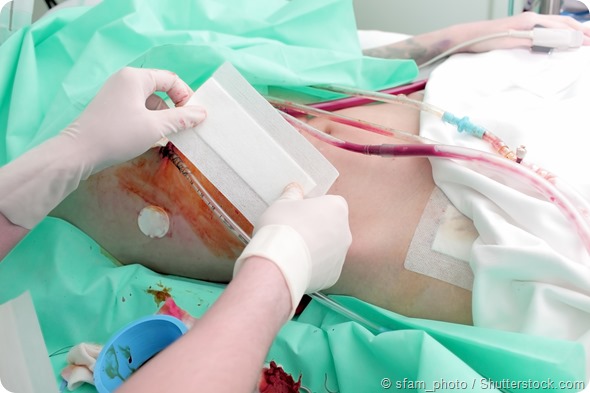ADPKD is a chronic, progressive and inherited kidney disease characterized by fluid-filled cysts that develop in the kidneys and other organs. It is the most common inherited kidney disease, and affects millions worldwide. There are no epidemiological registries that can give precise numbers affected.
Prevalence figures vary between 3 to 4 in 10,000 diagnosed patients, so well over 200,000 in the EU. ADPKD is an important cause of chronic kidney disease (CKD) and kidney failure, accounting for one in 10 patients needing kidney dialysis or transplantation.
The direct EU cost of treating ADPKD patients on dialysis or transplant is approx. 1.5 billion Euros/year and this will double to €3 billion when one adds costs of other medication and care resulting from symptoms.
Outside of nephrology, ADPKD is little known, even though its sufferers require complex, multidisciplinary care with a comprehensive assessment of their manifestations, complications and prognosis - all of which vary dramatically between individuals owing to the genotype variability even within families.
Coupled to this complex care management, ADPKD is associated with high healthcare costs since many individuals progress to kidney failure requiring dialysis and/or transplantation at an earlier age than other kidney patients - e.g. in the UK, the age of kidney failure is 55, compared with 65 for non-ADPKD patients.
%20and%20Abnormal%20Kidney%20(renal%20failure)%20showing%20scarring%20(blue)-vetpathologist.jpg)
Normal Kidney (left) and Abnormal Kidney (renal failure) showing scarring (blue)
Aside from the clinical and economical manifestations, ADPKD has detrimental effects on various other aspects of an individual’s life. Individuals with ADPKD have commented that the condition has a negative impact on their employment, obtaining health and/or life insurance and increases anxiety and depression due to the concerns of dialysis and transplantation, and the impact of a dominantly inherited condition on themselves and their families.
Why is there no standardized treatment and knowledge base surrounding the disease? What factors have limited the progress towards standardization?
The optimization and standardization of ADPKD care in Europe is hampered by the lack of evidence-based consensus guidelines and standardized care pathways. Although recommendations have been developed in certain countries (e.g. Spain) and for specific medication they are limited by the lack of good-quality data on many aspects of care.
The EAF Report cites data from the ERA-EDTA registry showing that the prevalence of dialysis or transplantation use for ADPKD varies between European countries. This variation thought to be a result of international differences in policies governing access to, and reimbursement of, dialysis and transplantation.
Currently, kidney transplantation is the treatment of choice for ADPKD. However, financial pressures, a shortage of donors and limitations in medical, surgical and nursing expertise are preventing more widespread use of kidney transplantation.

What is the ‘Brussels Declaration on ADPKD’, what does it signify and what changes does it hope to make to EU policy?
The declaration is a ‘Call to Action’ to policy makers, hospital managers, patient groups and those interested in ADPKD care. The declaration:
- Summarizes unmet needs in ADPKD
- Presents six policy-focused recommendations
These recommendations are broadly grouped into the following themes:
- Collaboration: Increase platform for continued dialogue and collaboration to improve the quality and longevity of lives of individuals with ADPKD
- Improved care: Develop model for ADPKD ‘tiered care’
- Research: Increased research collaboration
- Empower: Increase influence of and role of patient groups and their role in health technology assessments (i.e. contributing to the assessment of medications)
The primary goals of the Declaration are:
- Raise awareness of ADPKD and all its implications for patients, health services and economies in Europe
- Recommend strategies to improve ADPKD care at EU & national levels
- Encourage and facilitate collaboration between the individuals and groups involved in the management of ADPKD
What impact has the declaration made in the past year?
First in patient and nephrologist/HCP education:
- The declaration is freely available online via PKD International and in 8 different languages to ensure messages are widely accessible and used by patients/carers and patient organizations
- Print copies of publications have been available at nephrology congresses and nationally organized patient organization information days
- EAF video, available online via PKD International, distils the publications into 3 minutes to further ensure their availability to, and use by patients
- Joint patient advocate/EAF Faculty roundtable held to share views and aid collaboration.
Second in European change:
- EAF group with other European societies are now investigating what multidisplinary best practice care looks like.
- MEP Group for Kidney Health is championing ADPKD.
Third in National change:
- Spain: ‘ADPKD Alliance’ created, involving patient groups and clinicians to discuss ADPKD care management
- Value to patients as evidenced by national organization endorsements; 30 endorsements to date.
What future changes are you hoping will be made to the care models and treatment given to patients?
All eligible patients should have access to treatment, be that disease modifying treatment or symptomatic control.
Tiered care model will ensure that ADPKD care is co-ordinated and that care is built around the needs of the patient to ensure they receive the most appropriate care; currently this does not occur due to the complexity of the disease.
Can you give me a brief overview of the EAF? What efforts other than the Brussels Declaration are being employed to improve the care of patients with ADPKD?
The European ADPKD Forum: Translating science into policy
National initiatives e.g. ADPKD Alliance in Spain that is building patient education and proposed care models to ensure Spanish patients have the correct access to appropriate treatment.
Multi-disciplinary medical society position statement resulting from an EAF Faculty hosted, Multi Specialist Roundtable on ADPKD Care involving respective European societies that have an interest in the management of ADPKD care.
The roundtable explored the development and implementation of multidisciplinary/ tiered care models for ADPKD and defined minimum standards of care provision.
Where can readers find more information?
Patient should speak to their GP, nephrologist if they want more information.
Individuals can download the full report/declaration from PKD International; available in 9 languages (UK, DE, FR, IT, ES, IT, Turkish, Danish, Swedish) from the PKD International website
About Tess Harris
Tess Harris is President of PKD International and CEO of the UK Polycystic Kidney Disease Charity. She is General Secretary of the Ciliopathy Alliance, a board member of FEDERG and a European Medicines Agency Expert.
Tess is a member of the NHS England Renal Transplant Clinical Reference Group and the first patient to chair a Clinical Study Group for Cystic Diseases within the UK Kidney Research Consortium.
She inherited ADPKD along with 3 siblings (one deceased) from her father (also deceased) and has other affected relatives: niece, nephew and great-nephews.
Prior to her charity roles, Tess was an entrepreneur in cosmetics, defense, spectacles and online leadership learning. She is a former international chairman of the Chartered Institute of Marketing and latterly lectured in e-business. In her spare time, she designs websites and is an aspiring novelist and children’s book writer.